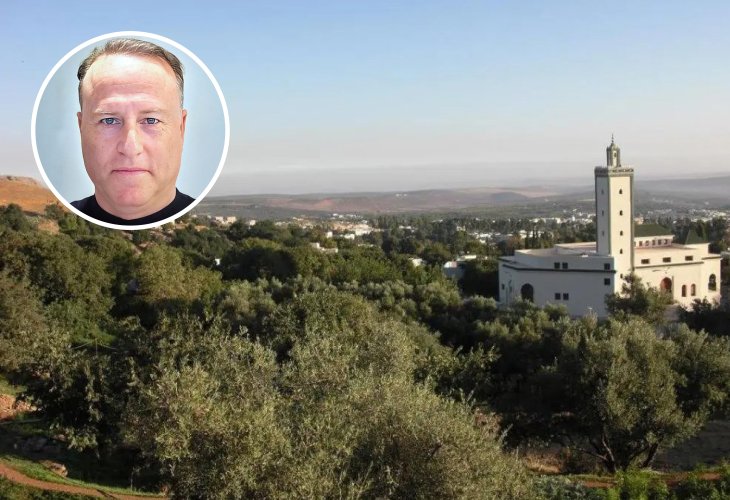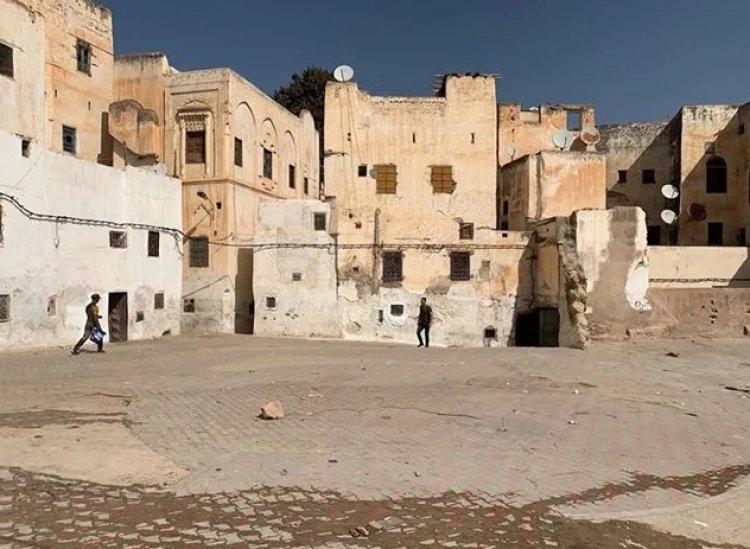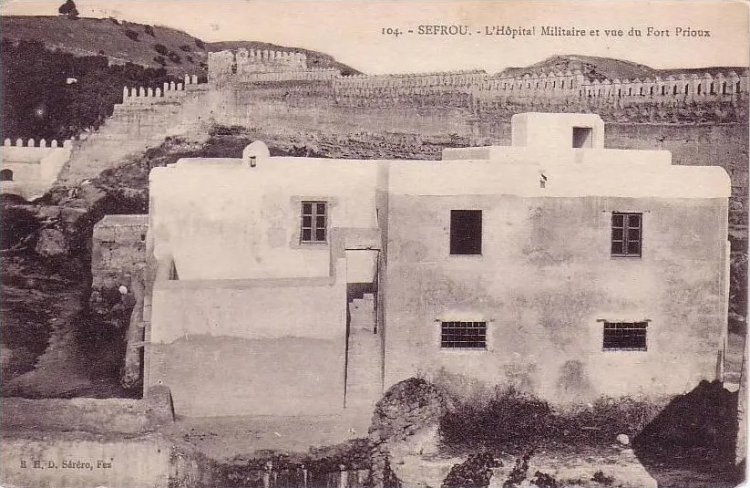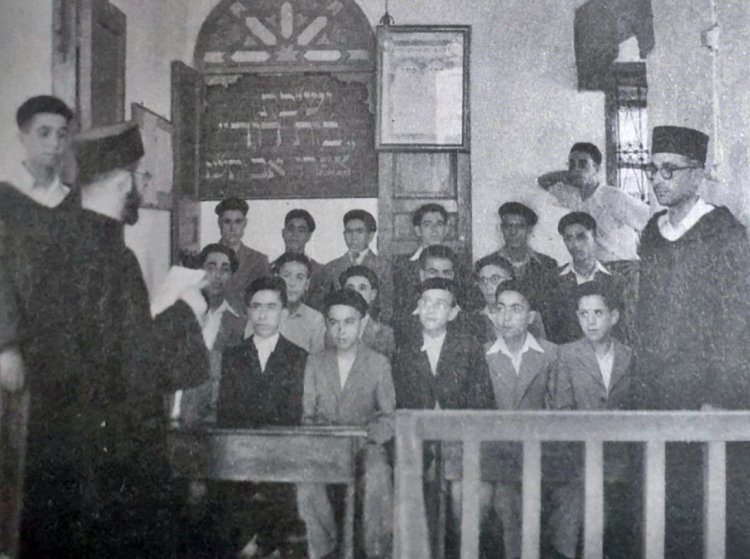"And Then He Asked Me: 'Do You Know You Were the Last Jewish Baby Born in Tzefrou'?"
Forty-five years after moving to Israel from Tzefrou, Morocco, Eli Toubli embarked on a mission to document the Jews of the city, their memories, and customs. Discover the surprising revelations he uncovered over the years.

Tzefrou is a small city in Morocco, now home to barely 75,000 people with not a single Jewish resident among them. Yet, mentioning its name ignites a nostalgic spark and unforgettable memories among thousands of Jews in Israel and around the world. Until the 1970s, Tzefrou was considered one of the most prominent Jewish cities in Morocco, with a vibrant community life, and at times, Jews made up half of its population.
"My greatest fear is that as time goes by, people will completely forget Tzefrou, its traditions, and its inhabitants," says Eli Toubli, born in Tzefrou in the 1970s and brought to Israel with his family just a few months later as a baby. This concern spurred his commitment to preserve the city's heritage before it was too late.
The Hourglass is Running Out
"Truthfully, I surprised even myself when I began this journey," Eli mentions. "Through years focused on building my personal life, while aware of being born in Tzefrou, Morocco, it did not preoccupy me much. This changed about 15 years ago after my father passed away, leaving us to consider ways to commemorate him in a manner he'd have chosen."
Eli emphasizes that his father, R' Moshe Toubli z"l, was a community pillar in Morocco and a synagogue gabbai. "We knew well that Tzefrou's customs were dear to him, and realizing this, I wanted to commemorate his memory through community-related activities, though I was unsure how at first. Approximately seven years after his passing, during a synagogue celebration, a good friend of my father asked, 'Do you know you were the last Jewish baby born in Tzefrou?' This revelation struck me, clarifying a purpose. I decided in that moment to gather materials and set up a memorial website for the massive Jewish community that once existed in Tzefrou, whose descendants are now scattered globally."
The project started humbly. "Initially, it was just me writing and sharing my articles and collected materials on the website. Soon, Tzefrou natives from all over the globe joined in. The project became international, with more and more people contributing stories about their parents, grandparents, and history. Yet even now, after over six years of work, we've barely scratched the surface of this unique community and its people; the task ahead remains immense."

The Mission: Document
Toubli clarifies that documenting Tzefrou is not his daily occupation, as he owns a real estate business. Still, he dedicates his nights and all his spare time to this cause, understanding time is fleeting, and soon there will be no one left to document it.
"Whenever I hear of someone who or whose parents lived in Tzefrou, I spend special effort encouraging them to delve into their attic and uncover historical treasures stored at home. Admittedly, this is a hefty task, and not everyone is interested, but I strive to motivate individuals to reveal what they have, assuming that although it may not matter to them now, it could become central in their lives in the future, just like my story."
Can you tell us about the Tzefrou community? What made it so unique?
"This is a question I have asked myself often – what about Tzefrou made it so central and special? Of course, I can't provide a personal account because as an infant, I wasn't fortunate to experience the community. Yet reality shows that Tzefrou's community produced many learned scholars and prominent rabbis, surpassing the average of other Moroccan cities. As such, some have named it 'The Jerusalem of Morocco.' Many residents engaged in Torah-related occupations while also excelling in business and routine matters. Some families recount residing in Tzefrou for generations, dating back to its establishment around the 7th century."
There are numerous sites and projects memorializing all of Moroccan Jewry. Why is a separate commemoration for Tzefrou necessary?
"Tzefrou was distinct from other Moroccan communities," Toubli stresses. "This was evident in different prayer melodies, unique arrangements and orders of prayer, distinct foods, and even the way they spoke, identifying natives of the city with different pronunciations. For example, Tzefrou Jews used an Aleph instead of a Quf and substituted a Tzadi for a Tet. Most Jews there were fair-skinned with blue eyes. Tzefrou remained distinct from other Jewish communities, even compared to nearby Fes, just a 20-minute drive away. After relocating to Israel, one could easily distinguish between Tzefrou exiles and those from other Moroccan cities because they didn’t mix."
"That’s why my father felt it his lifelong mission to guide and preserve the community - he printed sheets on holiday customs and sent them to community members to learn about past celebrations, reminded them of the different celebrations of tzadikim, particularly the celebration of the tzadik referred to as the Rama of Tzefrou, R' Raphael Moshe Elbaz z”l, and insisted on praying in Tzefrou’s precise traditional style. I’ve merely taken a small part of my father’s activities and brought it to the web, and I strive daily to delve deeper and improve."

A Global Community
In addition to the website memorial, is the community still active physically?
"Certainly. The community's hub in Israel is currently in Ashdod, but there are also synagogues and yeshivas of Tzefrou emigrants in Ramle, Givat Olga, Jerusalem, and other cities. I believe it’s nearly the only community from Morocco that continues maintaining itself and its distinctiveness today. We frequently gather, celebrate the rabbis' commemorations, and various holidays. Soon we will celebrate Tu Bishvat with a special commemoration, as was customary annually in Tzefrou."
If your father were alive today, do you think he’d be satisfied with the memorial and activities?
"That is a question I often ponder. Knowing my father, I think he would be very pleased with the endeavor itself to document but saddened much essential knowledge wasn't collected adequately, such as Tzefrou's prayer tunes I’ve been endeavoring to revive for years, albeit unsuccessfully in full. I am certain that if he were alive, he’d have contributed immensely, reinforcing the sentiment that with each passing community member, we lose not only them physically but also a vast repository of communal knowledge.
"This is why I endeavor to do my utmost to document the Jews of Tzefrou, often visiting synagogues, recording prayers, questioning attendees, and collecting as many memories as possible. I also encourage others to participate in documentation and commemoration tasks, as these memories will not return and must be preserved."

And surely, as someone documenting Tzefrou, have you had the chance to return and visit there?
"I realize it might seem ironic, but despite having traveled to numerous countries worldwide, I haven’t visited Tzefrou. I purchased a ticket just before the COVID period, but the pandemic halted all plans. This year, I intended to fly after the holidays as part of a project with Moroccan expatriates renovating the city's Jewish cemetery, yet the outbreak of war canceled the trip as well. However, with Hashem's help, I will indeed visit Tzefrou someday, which although I do not remember, resides deeply in my heart."

